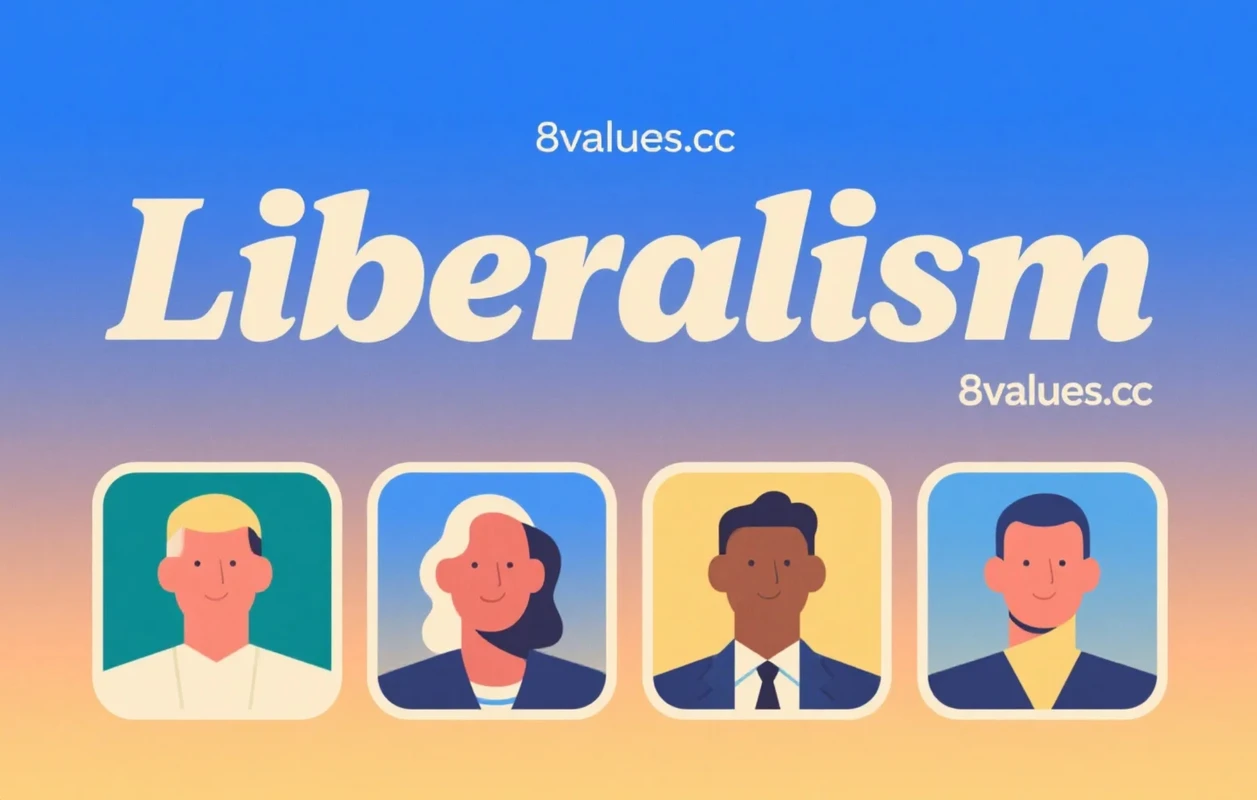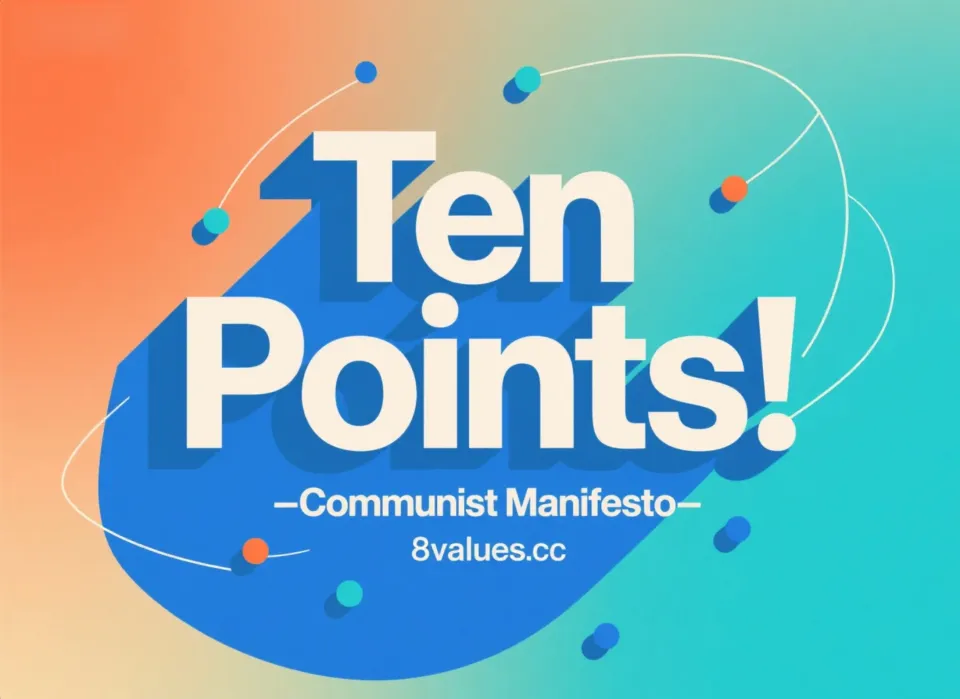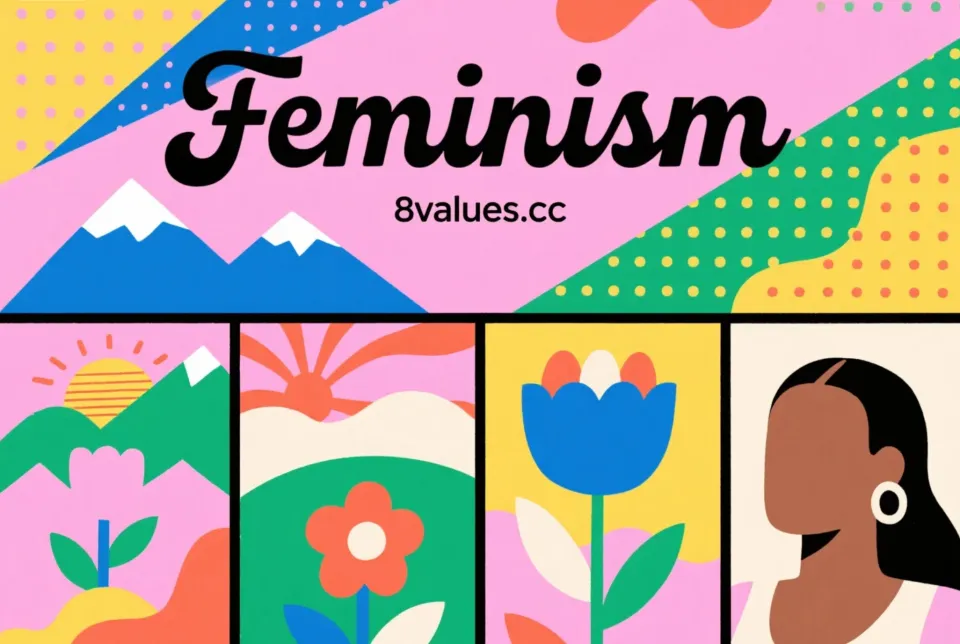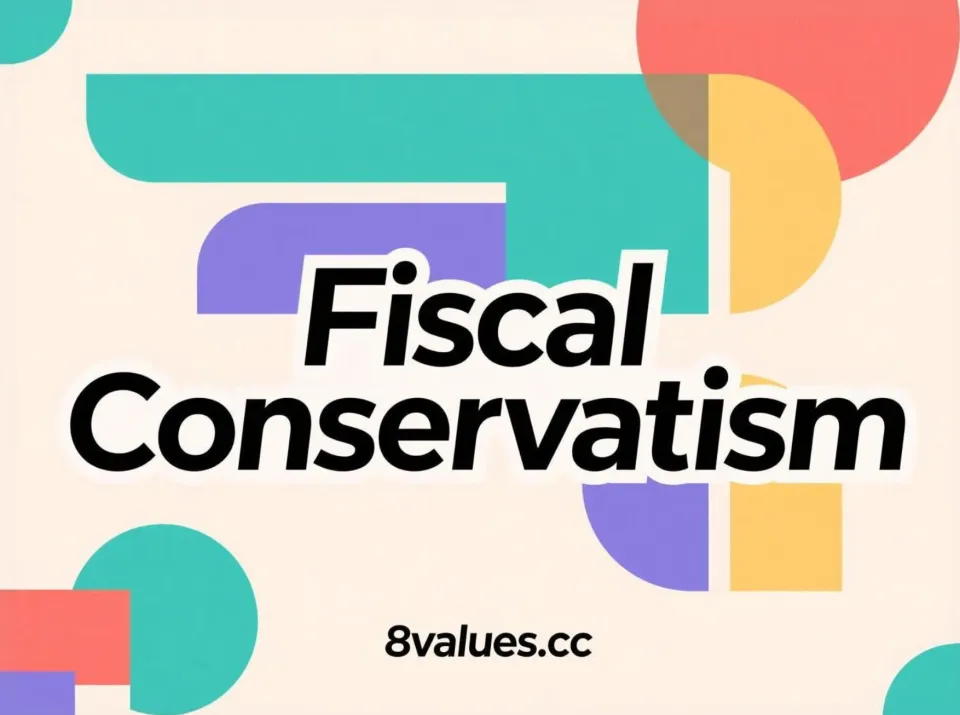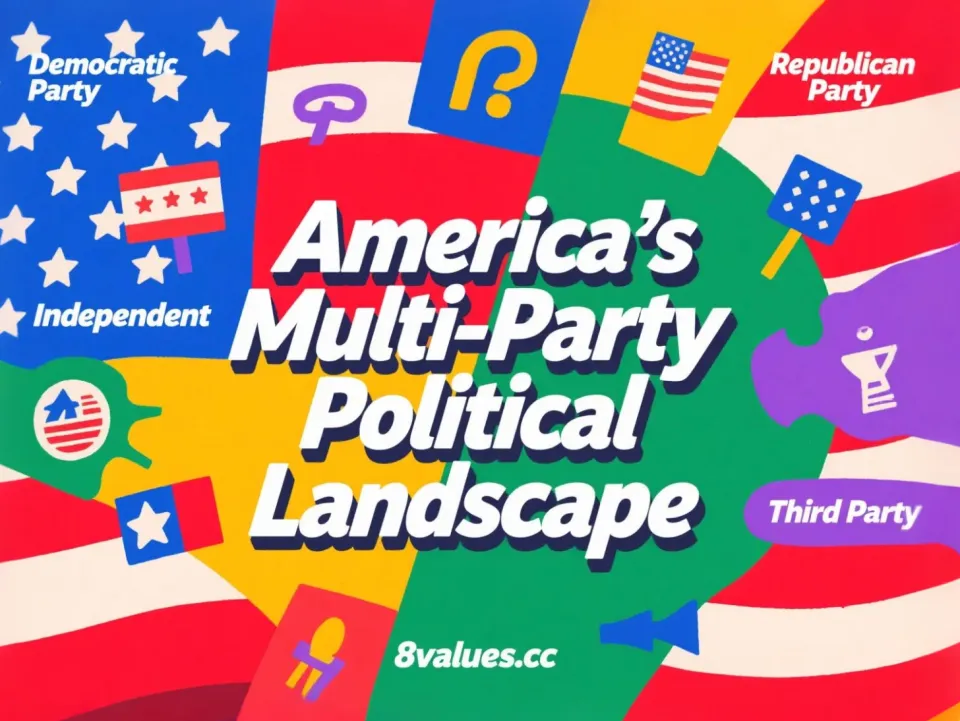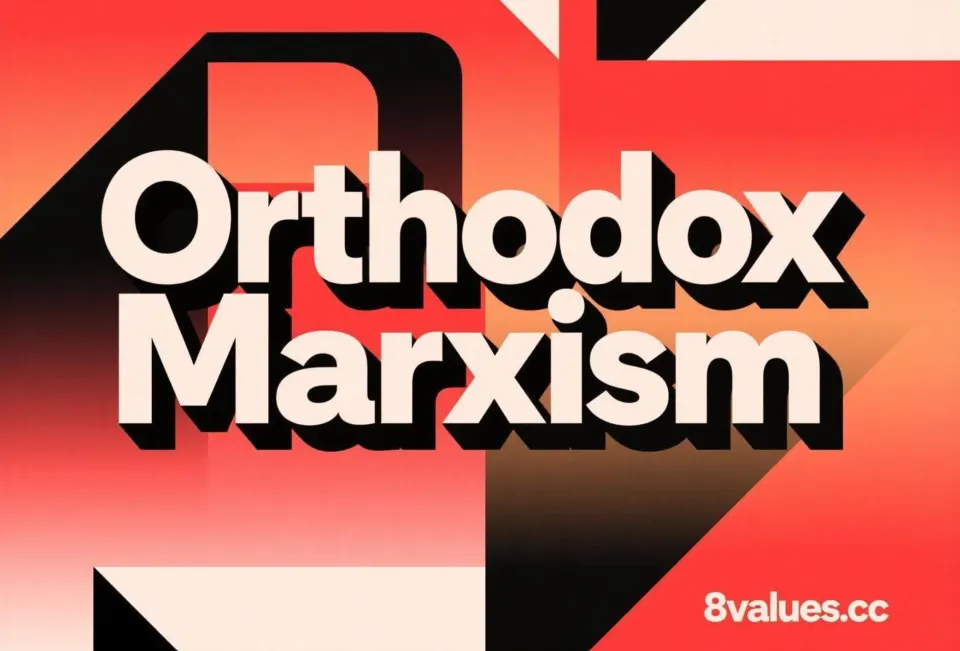เสรีนิยม | 8 ค่าตีความของอุดมการณ์อุดมการณ์ในการทดสอบทางการเมือง
บทความนี้จะอธิบายรายละเอียดเกี่ยวกับความหมายแฝงอย่างลึกซึ้งและความร่ำรวยของเสรีนิยมวิวัฒนาการจากยุคคลาสสิกถึงยุคปัจจุบันหลักการสำคัญและการรวมตัวกันในเสรีภาพส่วนบุคคลบทบาทระดับชาติและการพัฒนาเศรษฐกิจและสังคมช่วยให้คุณวางตำแหน่งทางการเมืองของคุณอย่างแม่นยำมากขึ้นผ่านการทดสอบคุณค่าทางการเมือง 8 ค่า
เสรีนิยมเป็นปรัชญาทางการเมืองและศีลธรรมที่มีรากฐานมาจากเสรีภาพและสิทธิส่วนบุคคล มันสนับสนุนการเมืองประชาธิปไตยความเท่าเทียมกันสำหรับทุกคนก่อนกฎหมายและเศรษฐกิจตลาดเสรี อย่างไรก็ตามเสรีนิยมนั้นไม่ได้เป็นหลักคำสอนแบบคงที่เพียงอย่างเดียว แต่เป็นระบบอุดมการณ์ขนาดใหญ่ที่มีประวัติศาสตร์อันยาวนานการพัฒนาที่ซับซ้อนและหลายสาขา มันนำเสนอความเข้าใจและการปฏิบัติที่หลากหลายและขัดแย้งกันในช่วงเวลาต่าง ๆ ภูมิภาคและระหว่างนักคิดที่แตกต่างกัน การทำความเข้าใจเสรีนิยมนั้นเหมือนกับการเยี่ยมชมแกลเลอรีศิลปะซึ่งต้องใช้ใจที่เปิดกว้างเพื่อชื่นชมความหลากหลายแม้ว่าบางส่วนจะเข้าใจได้ยากในตอนแรก
หากคุณได้ลอง การทดสอบทางการเมือง 8 ค่า และได้รับผลลัพธ์ "เสรีนิยม" หรือต้องการมีความเข้าใจที่ลึกซึ้งยิ่งขึ้นเกี่ยวกับอุดมการณ์นี้ที่ครอบงำภูมิทัศน์ทางการเมืองระดับโลกบทความนี้จะให้มุมมองที่ครอบคลุมและลึกซึ้ง
สาระสำคัญหลักและหลักการพื้นฐานของเสรีนิยม
แก่นแท้ของเสรีนิยมอยู่ในความมุ่งมั่นต่อบุคคลและการสร้างสังคมที่ช่วยให้ผู้คนตระหนักถึงผลประโยชน์และศักยภาพของตนเอง มันเน้นว่ามนุษย์เป็นคนแรกและสำคัญที่สุดที่ได้รับเหตุผลซึ่งกำหนดให้แต่ละคนควรเพลิดเพลินไปกับอิสรภาพสูงสุดที่เป็นไปได้โดยไม่ละเมิดเสรีภาพที่เท่าเทียมกันของผู้อื่น
ความเป็นสากลของลัทธิเสรีนิยมอยู่ในความจริงที่ว่ามันคิดว่าสวัสดิการของเสรีภาพเหล่านี้เป็นของแต่ละบุคคลโดยไม่คำนึงถึงเพศเชื้อชาติสถานที่เกิดศาสนารสนิยมทางเพศความมั่งคั่งชนชั้นหรือลักษณะโดยบังเอิญอื่น ๆ ความคิดนี้รวบรวมความเชื่อในความเท่าเทียมทางศีลธรรมโดยธรรมชาติของบุคคลมนุษย์
หลักการพื้นฐานครอบคลุมประเด็นต่อไปนี้:
- สิทธิส่วนบุคคลและเสรีภาพ: สิทธิส่วนบุคคล และเสรีภาพมีสิทธิและเสรีภาพโดยธรรมชาติเช่นเสรีภาพในการพูดเสรีภาพในการกดเสรีภาพในการนับถือศาสนาและเสรีภาพในการชุมนุมและสมาคม ฯลฯ สิทธิเหล่านี้ควรได้รับการคุ้มครองจากรัฐบาล พื้นฐานของความถูกต้องตามกฎหมายของอำนาจของรัฐอยู่ในการคุ้มครองและการตระหนักถึงสิทธิเหล่านี้
- ความยินยอมของผู้ปกครอง : ความชอบธรรมของรัฐบาลมาจากความยินยอมของผู้ปกครอง ผู้คนมีสิทธิ์ที่จะถอนความไว้วางใจในรัฐบาลหรือแม้แต่โค่นล้มรัฐบาลเมื่อไม่สามารถรับผลประโยชน์หรือละเมิดสัญญาทางสังคม
- ความเท่าเทียมกันก่อนกฎหมาย : บุคคลทุกคนโดยไม่คำนึงถึงภูมิหลังหรือสถานะทางสังคมของพวกเขาควรได้รับการปฏิบัติอย่างเท่าเทียมกันก่อนกฎหมายและเพลิดเพลินกับสิทธิและการคุ้มครองกฎหมายเดียวกัน
- รัฐธรรมนูญและรัฐบาล จำกัด : อำนาจของรัฐบาลจะต้องถูก จำกัด เพื่อป้องกันไม่ให้ละเมิดเสรีภาพส่วนบุคคล รัฐธรรมนูญการตรวจสอบและถ่วงดุลอำนาจและหลักนิติธรรมเป็นกุญแจสำคัญในการปกป้องสังคมเสรีจากการคุกคามของการปกครองแบบเผด็จการของรัฐบาล
- Rationalism : Liberals มองโลกในแง่ดีเกี่ยวกับธรรมชาติของมนุษย์และเชื่อว่ามนุษย์เป็นสิ่งมีชีวิตที่มีเหตุผลและสามารถใช้เหตุผลและตรรกะเพื่อตัดสินผลประโยชน์ของตนเองและทำการตัดสินใจที่มีประสิทธิภาพซึ่งจะส่งเสริมความก้าวหน้าโดยรวมของสังคม
- ความอดทน : สังคมควรเคารพและทนต่อความเชื่อวิถีชีวิตและอัตลักษณ์ที่แตกต่างกันตราบใดที่พวกเขาไม่ได้ทำร้ายผู้อื่น "หลักการทำร้าย" ของ John Stuart Mill เป็นหัวใจสำคัญของปรัชญานี้
- สิทธิในทรัพย์สินส่วนตัว : สิทธิในทรัพย์สินส่วนตัวถือเป็นองค์ประกอบที่จำเป็นของเสรีภาพส่วนบุคคลและความเจริญรุ่งเรืองทางเศรษฐกิจและควรได้รับการคุ้มครองตามกฎหมาย
ต้นกำเนิดทางประวัติศาสตร์และขั้นตอนการพัฒนาของเสรีนิยม
เสรีนิยมในฐานะที่เป็นขบวนการทางการเมืองที่ชัดเจนหยั่งรากในยุคการตรัสรู้ในศตวรรษที่ 17 และกลายเป็นที่นิยมอย่างรวดเร็วในหมู่นักปรัชญาและนักเศรษฐศาสตร์ในโลกตะวันตก มันปฏิเสธบรรทัดฐานทางสังคมและการเมืองเก่า ๆ เช่นสิทธิพิเศษทางพันธุกรรมศาสนาของรัฐสถาบันกษัตริย์และราชาธิปไตยอันศักดิ์สิทธิ์และพยายามแทนที่มันด้วยประชาธิปไตยตัวแทนและกฎของกฎหมาย
- ลัทธิเสรีนิยมคลาสสิก :
- ต้นกำเนิดและข้อเสนอ : นักคิดการตรัสรู้เช่น John Locke ในศตวรรษที่ 17 และ 18 ได้รับการยอมรับว่าเป็นผู้ก่อตั้งเสรีนิยมสมัยใหม่ ร็อคเสนอว่าผู้คนมีสิทธิตามธรรมชาติต่อชีวิตเสรีภาพและทรัพย์สินและรัฐบาลจะต้องรับประกันสิทธิเหล่านี้บนพื้นฐานของสัญญาทางสังคมมากกว่าการละเมิด ลัทธิเสรีนิยมแบบคลาสสิกเน้นอิสรภาพส่วนบุคคลทรัพย์สินส่วนตัวและลดการแทรกแซงของรัฐบาลและผู้สนับสนุนให้บรรลุความก้าวหน้าทางสังคมผ่านเศรษฐกิจตลาดเสรีและการแสวงหาผลประโยชน์ส่วนบุคคล
- นักคิดที่สำคัญ : นอกเหนือจากล็อคแล้วอดัมสมิ ธ ยังเป็นบุคคลสำคัญในเสรีนิยมคลาสสิก เขาวางรากฐานสำหรับระบบทุนนิยมตลาดเสรี (หรือ "เศรษฐกิจขี้เกียจ") ผ่าน "ความมั่งคั่งของชาติ" โทมัสเจฟเฟอร์สันได้รับอิทธิพลอย่างลึกซึ้งจากความคิดของล็อคและบูรณาการหลักการของเสรีนิยมเข้ากับการประกาศอิสรภาพของสหรัฐฯและรัฐธรรมนูญ
- เหตุการณ์ทางประวัติศาสตร์ : การปฏิวัติอังกฤษอันรุ่งโรจน์ในปี 1688 การปฏิวัติอเมริกาในปี 1776 และการปฏิวัติฝรั่งเศสในปี 1789 ทั้งหมดใช้ปรัชญาเสรีนิยมเพื่อโค่นล้มราชาธิปไตย
- เสรีนิยมสมัยใหม่ (เสรีนิยมสมัยใหม่ / ลัทธิเสรีนิยมทางสังคม) :
- การเพิ่มขึ้นและการเปลี่ยนแปลง : ในตอนท้ายของศตวรรษที่ 19 และต้นศตวรรษที่ 20 เนื่องจากการปฏิวัติอุตสาหกรรมทำให้เกิดช่องว่างระหว่างคนรวยและคนจนและความอยุติธรรมทางสังคมอุดมคติของตลาดเสรีนิยมคลาสสิกถูกท้าทาย เสรีนิยมสมัยใหม่ (หรือ "เสรีนิยมทางสังคม") เกิดขึ้นโดยมุ่งเน้นไปที่ความยุติธรรมทางสังคมและสวัสดิการมากขึ้นและสนับสนุนว่ารัฐบาลควรแทรกแซงกิจการทางเศรษฐกิจและสังคมอย่างแข็งขันเพื่อให้แน่ใจว่า "เสรีภาพในการใช้งาน" และ "ความเท่าเทียมกันของโอกาส"
- นักคิดและนโยบายที่สำคัญ : John Stuart Mill ถูกมองว่าเป็นบุคคลในช่วงเปลี่ยนผ่านที่เชื่อมโยงเสรีนิยมแบบคลาสสิกและสมัยใหม่ โทมัสฮิลล์กรีนเป็นผู้สนับสนุนทฤษฎีอิสรภาพที่กระตือรือร้น ความคิดทางเศรษฐกิจของ John Maynard Keynes รวมถึงข้อตกลงใหม่โดยประธานาธิบดีสหรัฐแฟรงคลินดี. รูสเวลต์และการก่อสร้างรัฐสวัสดิการในสหราชอาณาจักร (เช่นรายงาน Beveridge) เป็นตัวอย่างทั่วไปของการปฏิบัติเสรีนิยมสมัยใหม่ ทฤษฎีความยุติธรรมของ John Rawls ให้พื้นฐานทางปรัชญาโดยละเอียดสำหรับทฤษฎีเสรีนิยมสมัยใหม่ของความยุติธรรมทางสังคม
- ลัทธิเสรีนิยมใหม่ :
- ความเป็นมาและข้อเสนอ : ลัทธิเสรีนิยมใหม่ที่เกิดขึ้นในปี 1970 เป็นการตอบสนองต่อเสรีนิยมสมัยใหม่สนับสนุนการกลับไปสู่หลักการของลัทธิเสรีนิยมแบบคลาสสิกโดยเน้นตลาดเสรีโลกาภิวัตน์และการแปรรูปลดการแทรกแซงของรัฐบาลการลดภาษีและการผ่อนคลายเพื่อส่งเสริมการเติบโตทางเศรษฐกิจ
- ตัวแทน : Margaret Thatcher และ Ronald Reagan เป็นตัวแทนของลัทธิเสรีนิยมใหม่ในการปฏิบัติทางการเมือง
- ความแตกต่างจากเสรีนิยมใหม่ : เป็นที่น่าสังเกตว่าแม้ว่า "ลัทธิเสรีนิยมใหม่" และ "เสรีนิยมใหม่" เป็นเพียงคำเดียวที่แตกต่างกัน แต่ทั้งสองอยู่ในทิศทางเดียวกันในแง่ของเวลาและแนวคิดของการเพิ่มขึ้น "เสรีนิยมใหม่" หมายถึงแนวโน้มการปฏิรูปสังคมในตอนท้ายของศตวรรษที่ 19 และต้นศตวรรษที่ 20 และเป็นแหล่งสำคัญของแนวคิดของรัฐสวัสดิการ
การทำความเข้าใจเสรีภาพ: การถกเถียงกันระหว่างเสรีภาพเชิงลบและเสรีภาพในเชิงบวก
มีความแตกต่างอย่างมีนัยสำคัญในการทำความเข้าใจ "เสรีภาพ" ภายในเสรีนิยมซึ่งเป็นพื้นฐานที่สำคัญสำหรับการแบ่งแยกระหว่างลัทธิเสรีนิยมคลาสสิกและเสรีนิยมสมัยใหม่ นักคิดชาวอังกฤษอิสยาห์เบอร์ลินเสนอแนวคิดหลักสองประการของอิสรภาพ:
- เสรีภาพเชิงลบ :
- คำจำกัดความ : หมายถึงอิสรภาพจากการบีบบังคับหรือการแทรกแซง บุคคลมีอิสระหากพวกเขาไม่ได้ถูกขัดขวางหรือถูก จำกัด โดยรัฐหรือกองกำลังภายนอกอื่น ๆ โดยทั่วไปแล้ว Liberals แบบคลาสสิกถือมุมมองนี้ว่าบทบาทของรัฐบาลควรถูก จำกัด ไว้ที่รัฐ "Night Watch" เช่นการแทรกแซงเฉพาะเมื่อจำเป็นเพื่อรักษากฎหมายและความสงบเรียบร้อยและปกป้องทรัพย์สินส่วนตัวและสิทธิส่วนบุคคล
- ตัวแทน : John Locke และ Adam Smith เป็นผู้สนับสนุนเสรีภาพเชิงลบ หลักการความเจ็บปวดของมิลล์ยังสนับสนุนวิสัยทัศน์ของการแทรกแซงของรัฐน้อยที่สุด
- เสรีภาพเชิงบวก :
- คำจำกัดความ : หมายถึงเสรีภาพในการทำอะไรบางอย่างนั่นคือความสามารถของแต่ละบุคคลในการควบคุมชีวิตของเขาและตระหนักถึงศักยภาพของเขา เสรีนิยมสมัยใหม่เชื่อว่ามันไม่เพียงพอที่จะมีการแทรกแซงจากภายนอกและหากบุคคลไม่สามารถพัฒนาความสามารถของตัวเองได้เนื่องจากความยากจนการเลือกปฏิบัติหรือสภาพสังคมอื่น ๆ ก็ไม่สามารถเรียกได้ว่าเสรีภาพที่แท้จริง ดังนั้นรัฐควรใช้มาตรการเชิงบวกเพื่อสร้างเงื่อนไขที่ดีเพื่อช่วยให้บุคคลตระหนักถึงศักยภาพของพวกเขา
- ตัวแทน : TH Green เป็นผู้สนับสนุนทฤษฎีเสรีภาพเชิงบวก ทฤษฎีความยุติธรรมทางสังคมของ John Rawls ได้รับการออกแบบมาเพื่อให้แน่ใจว่าทุกคนมีความสามารถในทางปฏิบัติเพื่อให้บรรลุเสรีภาพ
การต่อสู้ระหว่างบทบาทของประเทศ: การเฝ้าดูรัฐกลางคืนและการเสริมอำนาจรัฐ
โดยทั่วไปแล้ว Liberals เชื่อว่ารัฐมีความจำเป็น แต่พวกเขาก็กังวลอย่างลึกซึ้งเกี่ยวกับ "ศักยภาพที่ชั่วร้าย" ของศักยภาพของรัฐในการละเมิดเสรีภาพส่วนบุคคล ดังนั้นอำนาจของรัฐจะต้องถูก จำกัด
- Night-Watchman State :
- ท่าทางเสรีนิยมแบบคลาสสิก : สนับสนุน "รัฐที่เล็กที่สุด" ซึ่งมีหน้าที่ จำกัด อยู่ที่การรักษาความสงบเรียบร้อยในประเทศและความปลอดภัยส่วนบุคคลต่อต้านภัยคุกคามภายนอกและการจลาจลภายใน แต่พยายามอย่าเข้าไปยุ่งเกี่ยวกับกิจการส่วนตัวและเศรษฐกิจของประชาชน สิ่งนี้สอดคล้องกับหลักการของเสรีภาพเชิงลบ
- ความกังวล : การแทรกแซงของรัฐบาลมากเกินไปไม่เพียง แต่ละเมิดเสรีภาพ แต่ยังสามารถนำไปสู่ความไร้ประสิทธิภาพและยับยั้งการเติบโตทางเศรษฐกิจ
- การเปิดใช้งานสถานะ :
- ตำแหน่งเสรีนิยมสมัยใหม่ : ได้รับอิทธิพลจากแนวคิดของลัทธิเสรีนิยมที่ใช้งานอยู่และการพัฒนาปัจเจกนิยมลัทธิเสรีนิยมสมัยใหม่เชื่อว่ารัฐจำเป็นต้องเข้าไปแทรกแซงในบางจุดเพื่อช่วยคนอ่อนแอแทนที่จะไม่เข้าไปยุ่ง
- ความรับผิดชอบ : ประเทศที่มีอำนาจควรให้การสนับสนุนด้านการศึกษา, การดูแลสุขภาพ, ประกันสังคม ฯลฯ เพื่อให้แน่ใจว่าทุกคนมีโอกาสที่จะตระหนักถึงศักยภาพของพวกเขา ซึ่งหมายถึงการระดมทุนสำหรับการบริการสาธารณะผ่านระบบภาษีที่ก้าวหน้าซึ่งจะช่วยเพิ่มเสรีภาพส่วนบุคคลอย่างแข็งขัน
แนวคิดทางเศรษฐกิจของเสรีนิยม: ตลาดเสรีและการแทรกแซงของรัฐ
เสรีนิยมสนับสนุนทุนนิยมและทรัพย์สินส่วนตัวอย่างยิ่งและเชื่อว่าเสรีภาพทางเศรษฐกิจเป็นส่วนสำคัญของเสรีภาพส่วนบุคคล
- ระบบทุนนิยม Laissez-Faire :
- ท่าทางเสรีนิยมแบบคลาสสิก : สนับสนุนเศรษฐกิจตลาดเสรีโดยมีการแทรกแซงของรัฐบาลน้อยที่สุดรวมถึงกฎระเบียบที่น้อยมากการใช้จ่ายของรัฐบาลต่ำและภาษีต่ำ ทฤษฎี "มือที่มองไม่เห็น" ของอดัมสมิ ธ เชื่อว่าบุคคลจะส่งเสริมความเป็นอยู่โดยรวมของสังคมโดยธรรมชาติเมื่อแสวงหาผลประโยชน์ของตนเอง
- ความเชื่อ : รูปแบบทางเศรษฐกิจนี้สามารถส่งเสริมประสิทธิภาพนวัตกรรมและความก้าวหน้าโดยรวมและสร้างสังคมที่เลือกได้ดีที่สุด
- Keynesianism และการเปิดใช้งานรัฐ :
- ตำแหน่งเสรีนิยมสมัยใหม่ : Keynesianism เชื่อว่าเศรษฐกิจทุนนิยมตลาดเสรีมีแนวโน้มที่จะมีความเจริญรุ่งเรืองและภาวะเศรษฐกิจถดถอยซึ่งนำไปสู่การว่างงานขนาดใหญ่และความไม่มั่นคงทางเศรษฐกิจ ดังนั้นจึงจำเป็นสำหรับรัฐบาลที่จะแทรกแซงเศรษฐกิจอย่างแข็งขันและกระตุ้นความต้องการผ่านการใช้จ่ายสาธารณะปรับอัตราดอกเบี้ยและภาษีเพื่อรักษาเสถียรภาพทางเศรษฐกิจและให้การจ้างงาน
- วัตถุประสงค์ : ให้การสนับสนุนกลุ่มที่มีช่องโหว่ผ่านโครงการภาษีและสวัสดิการที่ก้าวหน้าความไม่เท่าเทียมทางเศรษฐกิจที่เกิดจากตลาดและทำให้แน่ใจว่าทุกคนเพลิดเพลินไปกับเสรีภาพทางเศรษฐกิจที่แท้จริง
ความเสมอภาคและความยุติธรรม: ความเท่าเทียมกันของรูปแบบและความเท่าเทียมกันของโอกาส
เสรีนิยมเน้นว่าบุคคลทุกคนมีค่าเท่ากันโดยไม่คำนึงถึงภูมิหลังและควรได้รับการปฏิบัติอย่างเป็นธรรมและเป็นกลาง
- ความเท่าเทียมกันอย่างเป็นทางการและการทำบุญ :
- ท่าทางเสรีนิยมแบบคลาสสิก : ส่วนใหญ่สนับสนุนรูปแบบความเท่าเทียมกันนั่นคือกฎหมายปฏิบัติต่อบุคคลทุกคนอย่างเท่าเทียมกันและไม่ลำเอียง พวกเขามองว่าสังคมเป็นระบบที่เลือกสิ่งที่ดีที่สุดและความสำเร็จขึ้นอยู่กับความสามารถและความพยายามของแต่ละบุคคล
- ตัวแทน : การสนับสนุนของ Mary Wollstonecraft สำหรับผู้หญิงที่จะต่อสู้เพื่อความเท่าเทียมกันอย่างเป็นทางการและโอกาสทางการศึกษา
- การโต้เถียง : วิสัยทัศน์ของล็อคนั้นมีข้อ จำกัด เป็นหลักสำหรับคนผิวขาวที่เป็นเจ้าของทรัพย์สินเมื่อพูดถึงความยินยอมและเสรีภาพซึ่งเผยให้เห็นข้อ จำกัด ในทางปฏิบัติของเสรีนิยมในช่วงต้น
- ความเท่าเทียมกันของโอกาสและความยุติธรรมทางสังคม :
- ท่าทางเสรีนิยมสมัยใหม่ : เป็นที่เชื่อกันว่าสังคมไม่ใช่ระบบธรรมชาติของการเลือกบุญและต้องดำเนินการอย่างแข็งขันโดยรัฐเพื่อส่งเสริมความเท่าเทียมกันที่แท้จริงของโอกาสสำหรับทุกคนและจัดการกับข้อเสียโครงสร้างและอคติทางสังคม
- ตัวแทน : "หลักการแตกต่าง" ที่เสนอโดย John Rawls เชื่อว่าความไม่เท่าเทียมกันทางสังคมและเศรษฐกิจเป็นเพียงในสถานการณ์ที่ดีที่สุดของกลุ่มที่อ่อนแอที่สุดของสังคมซึ่งมีจุดมุ่งหมายเพื่อให้บรรลุความยุติธรรมทางสังคมและความเท่าเทียมกันอย่างละเอียดมากขึ้น เสรีนิยมทางสังคมเช่น Betty Friedan สนับสนุนการแก้ไขการเลือกปฏิบัติผ่านมาตรการต่าง ๆ เช่นการกระทำที่ยืนยัน
ความหลากหลายและสาขาหลักของเสรีนิยม
ความซับซ้อนของเสรีนิยมอยู่ที่ความจริงที่ว่ามีโรงเรียนที่แตกต่างกันมากมายในนั้นโดยเน้นประเด็นต่าง ๆ เช่นเสรีภาพส่วนบุคคลการแทรกแซงของรัฐบาลและสวัสดิการสังคม ในการทดสอบทางการเมือง 8 ค่าคุณจะพบการแนะนำรายละเอียดเกี่ยวกับเสรีนิยมและ อุดมการณ์ที่เกี่ยวข้อง
- ลัทธิเสรีนิยมแบบคลาสสิก : เน้นอิสรภาพส่วนบุคคลทรัพย์สินส่วนตัวและรัฐบาลที่ จำกัด
- เสรีนิยมทางสังคม : มุ่งเน้นไปที่ความเสมอภาคทางสังคมและสวัสดิการสนับสนุนว่ารัฐบาลแทรกแซงตลาดผ่านภาษีและค่าใช้จ่ายทางสังคมเพื่อลดความยากจนปรับปรุงการศึกษาและปกป้องการดูแลทางการแพทย์ ในอเมริกาเหนือคำว่า "เสรีนิยม" มักจะหมายถึงการเสรีนิยมทางสังคมโดยเฉพาะ
- Libertarianism : รูปแบบที่รุนแรงของลัทธิเสรีนิยมแบบคลาสสิกที่สนับสนุนการลดการแทรกแซงของรัฐบาลโดยเฉพาะอย่างยิ่งในด้านเศรษฐกิจและเชื่อว่าเสรีภาพส่วนบุคคลและทรัพย์สินส่วนตัวเป็นสูงสุด
- ลัทธิเสรีนิยมใหม่ : เกิดขึ้นในปี 1970 โดยเน้นตลาดเสรีโลกาภิวัตน์และการแปรรูปและสนับสนุนการลดการแทรกแซงของรัฐบาลในสาขาเศรษฐกิจ
- ลัทธิเสรีนิยมทางวัฒนธรรม : เน้นความหลากหลายทางวัฒนธรรมเสรีภาพในการพูดและความอดทนและเชื่อว่าสังคมควรเคารพและทนต่อวัฒนธรรมความเชื่อและวิถีชีวิตที่แตกต่างกัน
- ลัทธิเสรีนิยมแบบอนุรักษ์นิยม : รวมค่านิยมและนโยบายเข้ากับตำแหน่งอนุรักษ์นิยม
คำวิจารณ์และความท้าทายของเสรีนิยม
แม้ว่าเสรีนิยมนั้นโดดเด่นในโลก แต่ก็เผชิญกับความท้าทายที่รุนแรงและการวิพากษ์วิจารณ์จากทั้งฝ่ายซ้ายและขวา
- คำวิจารณ์ด้านซ้าย :
- ความไม่เท่าเทียม : นักสังคมนิยมวิพากษ์วิจารณ์ลัทธิเสรีนิยมเพราะไม่สามารถแก้ปัญหาความไม่เท่าเทียมได้เพราะมันเกี่ยวข้องอย่างใกล้ชิดกับปรัชญาการแข่งขันของทุนนิยม มาร์กซิสต์ปฏิเสธพื้นฐานของทฤษฎีเสรีนิยมอย่างสมบูรณ์และพยายามโค่นล้มคำสั่งทุนนิยมผ่านการรวมกลุ่ม
- พิธีการ : นักวิจารณ์บางคนเชื่อว่าสิทธิและเสรีภาพเสรีนิยมเป็นเพียง "สิ่งที่เป็นทางการ" และคนจนไม่มีเงื่อนไขในการฝึกฝนเสรีภาพเหล่านี้
- การทำให้เป็นละอองและความแปลกแยก : คอมมิวนิสต์เชื่อว่าเสรีนิยมมากเกินไปเน้นบุคคลและเพิกเฉยต่อบทบาทของชุมชนในการก่อตัวของอัตลักษณ์และความหมายของแต่ละบุคคลซึ่งนำไปสู่การทำให้เป็นละอองทางสังคมและความแปลกแยก
- รากเหง้าของลัทธิล่าอาณานิคม : นักคิดบางคนเช่น Bhikhu Parekh ชี้ให้เห็นว่าเสรีนิยมมีรากฐานมาจากลัทธิล่าอาณานิคมของยุโรปและล้มเหลวในการจัดการกับความไม่เท่าเทียมกันของโครงสร้างที่สร้างขึ้น
- คำวิจารณ์ด้านขวา :
- ความคืบหน้าอย่างมาก : อนุรักษ์นิยมวิพากษ์วิจารณ์เสรีนิยมเพื่อแสวงหาความก้าวหน้าและผลประโยชน์ที่สำคัญซึ่งบ่อนทำลายค่านิยมทางสังคมแบบดั้งเดิมบนพื้นฐานของชุมชนและความต่อเนื่อง
- อัตราเงินเฟ้อของรัฐ : เสรีนิยมใหม่คัดค้านเสรีนิยมสมัยใหม่นำไปสู่อัตราเงินเฟ้อที่มากเกินไปของอำนาจของรัฐและรบกวนเศรษฐกิจ
- ความสัมพันธ์ทางศีลธรรม : บางคนเชื่อว่าเสรีนิยมนำไปสู่ความสัมพันธ์ทางศีลธรรมและความว่างเปล่าทางจิตวิญญาณ
- การปกครองแบบเผด็จการส่วนใหญ่ : เสรีนิยมยุคแรกเช่นมิลล์กังวลว่าประชาธิปไตยอาจนำไปสู่“ การปกครองแบบเผด็จการส่วนใหญ่” และระงับสิทธิหรือเสรีภาพส่วนบุคคลของชนกลุ่มน้อย
- ความท้าทายอื่น ๆ :
- ประชานิยม : ในช่วงไม่กี่ปีที่ผ่านมาขบวนการประชานิยมได้เกิดขึ้นทั่วโลกโจมตีชนชั้นสูงเสรีจากมวลชนและล้มเหลวในการจัดการกับความกังวลของคนทั่วไป
- เผด็จการ : ประเทศเผด็จการบางประเทศจะส่งเสริมนโยบายการเปิดเสรีในเชิงเศรษฐกิจ แต่รักษาเผด็จการทางการเมืองซึ่งก่อให้เกิดความท้าทายใหม่ต่อเสรีนิยม
ความสำคัญของเสรีนิยมในสังคมร่วมสมัยและความสัมพันธ์ระหว่างประเทศ
แม้จะมีความท้าทายมากมาย แต่เสรีนิยมยังคงเป็นหนึ่งในอุดมการณ์ทางการเมืองที่มีพลวัตและมีอิทธิพลมากที่สุดในโลกทุกวันนี้
- รากฐานที่สำคัญของการปกครองแบบประชาธิปไตย : ประเทศส่วนใหญ่ขึ้นอยู่กับประเพณีของระบอบประชาธิปไตยเสรีนิยมและพรรคการเมืองหลัก ๆ ยอมรับว่าการรักษาประเพณีและสถาบันประชาธิปไตยรวมถึงการปกป้องสิทธิและเสรีภาพส่วนบุคคล
- ผู้สนับสนุนความร่วมมือระหว่างประเทศ : เสรีนิยมเน้นการพึ่งพาซึ่งกันและกันและความเป็นไปได้ของความร่วมมือระหว่างประเทศในทฤษฎีความสัมพันธ์ระหว่างประเทศ มันสนับสนุนการส่งเสริมการระงับข้อพิพาทอย่างสันติการค้าเสรีและการพัฒนาร่วมกันผ่านสถาบันระหว่างประเทศ (เช่นสหประชาชาติธนาคารโลกองค์การการค้าโลกสหภาพยุโรป) และกฎหมายระหว่างประเทศ
- ทฤษฎีสันติภาพประชาธิปไตย : ทฤษฎีนี้ถือว่าความขัดแย้งทางทหารไม่น่าจะเกิดขึ้นระหว่างประเทศประชาธิปไตยเพราะพวกเขาแบ่งปันสถาบันประชาธิปไตยและค่านิยมและได้รับผลประโยชน์ร่วมกันผ่านการพึ่งพาอาศัยกันทางเศรษฐกิจและความร่วมมือระหว่างประเทศ
สรุป: วิสัยทัศน์เสรีสำหรับการอยู่ร่วมกันหลายครั้ง
นับตั้งแต่เกิดเสรีนิยมได้พัฒนาปรัชญาอย่างต่อเนื่องเพื่อปรับให้เข้ากับความต้องการของยุคและสภาพแวดล้อมที่แตกต่างกัน แม้ว่าจะซับซ้อนและหลากหลาย แต่ก็เป็นความมุ่งมั่นที่มั่นคงต่อเสรีภาพและศักดิ์ศรีส่วนบุคคล
ด้วยการให้ข้อมูลเชิงลึกเกี่ยวกับหลักการของเสรีนิยมวิวัฒนาการทางประวัติศาสตร์และความซับซ้อนภายในคุณจะสามารถเข้าใจภูมิทัศน์ทางการเมืองร่วมสมัยได้ดีขึ้นและมีความเข้าใจที่ชัดเจนเกี่ยวกับท่าทางทางการเมืองของคุณ คุณอาจต้องการเยี่ยมชม 8 ค่าทางการเมืองพิกัดการวิเคราะห์สเปกตรัม อีกครั้ง เมื่อรวมกับการตีความของบทความนี้สำรวจตำแหน่งที่เป็นเอกลักษณ์ของคุณเกี่ยวกับพิกัดเชิงอุดมการณ์ทางการเมืองและทบทวน การแนะนำรายละเอียดของผลลัพธ์ทางอุดมการณ์ 8 ค่าทั้งหมด เพื่อขยายขอบเขตทางการเมืองของคุณ
สำหรับเนื้อหาที่น่าตื่นเต้นมากขึ้นโปรดอ่าน บล็อก 8vlaues ต่อไป!
